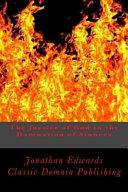Works
Sinners in the Hands of an Angry God
Jonathan Edwards
The Freedom of the Will
Jonathan Edwards
The Justice of God in the Damnation of Sinners
Jonathan EdwardsFamous Jonathan Edwards Quotes
Source: A careful & strict inquiry into the modern prevailing notions of that freedom of the will, which is supposed to be essential to moral agency, virtue & vice, reward & punishment, praise & blame...
Jonathan Edwards Quotes about God
“How can you expect to dwell with God forever, if you so neglect and forsake him here?”
Source: Selected Sermons of Jonathan Edwards
Source: Dictionary of Burning Words of Brilliant Writers (1895), p. 541.
Justification By Faith Alone (1738)
Source: Dictionary of Burning Words of Brilliant Writers (1895), p. 494.
Sinners in the Hands of an Angry God (1741)
Jonathan Edwards Quotes about Christ
Letter to Deborah Hatheway (1741), in Letters and Personal Writings (1998), edited by George S. Claghorn, Vol. 16.
Justification By Faith Alone (1738)
Source: Dictionary of Burning Words of Brilliant Writers (1895), p. 489.
Edwards later writes in this sermon... "The entire active uniting of the soul, or the whole of what is called coming to Christ, and receiving of him, is called faith in Scripture..."
Justification By Faith Alone (1738)
An Humble Attempt To Promote Explicit Agreement And Visible Union Of God’s People In Extraordinary Prayer For The Revival Of Religion And The Advancement Of Christ’s Kingdom On Earth from Edwards, Jonathan, The works of Jonathan Edwards (Vol. 2, p. 278). Banner of Truth Trust, Edinburgh, 1974.
Source: Dictionary of Burning Words of Brilliant Writers (1895), p. 489.
Jonathan Edwards: Trending quotes
The Mind (begun in September 1723; not completed).
Jonathan Edwards Quotes
“Resolved, never to do anything out of revenge.”
No. 14.
Seventy Resolutions (1722-1723)
“Unconverted men walk over the pit of hell on a rotten covering.”
Source: Sinners in the Hands of an Angry God
Source: The Sermons of Jonathan Edwards: A Reader
Source: The Works of Jonathan Edwards, Vol. 16: Letters and Personal Writings
“He who has a false hope, has not that sight of his own corruptions which the saint has.”
Jonathan Edwards, A Treatise Concerning Religious Affections (1746), PART II : Showing What Are No Certain Signs That Religious Affections Are Truly Gracious, Or That They Are Not, Ch. 11: Nothing can be certainly known of the nature of Religious Affections, that they much dispose persons with their mouths to praise and glorify God. <!-- (1831 edition), p. 194, also in Complete Christian Classics (1999), Vol. 1, p. 365 -->
Context: !-- He who has a false hope, has not that sight of his own corruptions which the saint has. A true Christian has ten times more to do with his heart and its corruptions, than a hypocrite: and the sins of his heart and practice, appear to him in their blackness; they look dreadful; and it often appears a very mysterious thing, that any grace can be consistent with such corruption, or should be in such a heart. But a false hope hides corruption, covers it all over, and the hypocrite looks clean and bright in his own eyes.
--> There are two sorts of hypocrites: one that are deceived with their outward morality and external religion; many of which are professed Arminians, in the doctrine of justification: and the other, are those that are deceived with false discoveries and elevations; which often cry down works, and men's own righteousness, and talk much of free grace; but at the same time make a righteousness of their discoveries, and of their humiliation, and exalt themselves to heaven with them. These two kinds of hypocrites, Mr. Shepard, in his Exposition of the Parable of the Ten Virgins, distinguishes by the names of legal and evangelical hypocrites; and often speaks of the latter as the worst. And it is evident that the latter are commonly by far the most confident in their hope, and with the most difficulty brought off from it: I have scarcely known the instance of such a one, in my life, that has been undeceived.
“Resolved, always to do that, which I shall wish I had done when I see others do it.”
No. 69.
Seventy Resolutions (1722-1723)
Justification By Faith Alone (1738)
Justification By Faith Alone (1738)
Source: Dictionary of Burning Words of Brilliant Writers (1895), p. 541.
“Christian practice is that evidence which confirms every other indication of true godliness.”
Source: Dictionary of Burning Words of Brilliant Writers (1895), p. 619.
And therefore it is that the apostle says, as he does in Rom. viii. 34. “Who is he that condemneth? It is Christ that died, yea rather, that is risen again.
Justification By Faith Alone (1738)
Source: Dictionary of Burning Words of Brilliant Writers (1895), p. 67.
Source: Dictionary of Burning Words of Brilliant Writers (1895), p. 542.
"The Beauty of the World" (c.1725), from the notebook The Images of Divine Things, The Shadows of Divine Things, The Language and Lessons of Nature (published 1948).
Source: Dictionary of Burning Words of Brilliant Writers (1895), p. 538.
Source: Dictionary of Burning Words of Brilliant Writers (1895), p. 304.
Justification By Faith Alone (1738)
"Personal Narrative" (1739), from The Works of President Edwards (1830) Vol. I, edited by Sereno B. Dwight.
Source: Dictionary of Burning Words of Brilliant Writers (1895), p. 396.
Source: Dictionary of Burning Words of Brilliant Writers (1895), p. 492.
Source: Dictionary of Burning Words of Brilliant Writers (1895), p. 331.
Source: Dictionary of Burning Words of Brilliant Writers (1895), p. 119.
Sinners in the Hands of an Angry God (1741)
No. 41.
Seventy Resolutions (1722-1723)
Written in 1723; from The Works of President Edwards, vol. I, ed. Sereno B. Dwight, 1830.
The young woman described here was Sarah Pierrepont, who became Edwards' wife in 1727.
"Personal Narrative" (1739), from The Works of President Edwards (1830) Vol. I, edited by Sereno B. Dwight.
Sinners in the Hands of an Angry God (1741)
Source: Dictionary of Burning Words of Brilliant Writers (1895), p. 302.
“Resolved, never to lose one moment of time; but improve it the most profitable way I possibly can.”
No. 5.
Seventy Resolutions (1722-1723)
Source: Dictionary of Burning Words of Brilliant Writers (1895), p. 489.
No. 29.
Seventy Resolutions (1722-1723)
No. 16.
Seventy Resolutions (1722-1723)
No. 1.
Seventy Resolutions (1722-1723)
A History of the Work of Redemption including a View of Church History (1839).
“You have reason to wonder that you are not already in hell.”
Sinners in the Hands of an Angry God (1741)
Justification By Faith Alone (1738)
Source: Dictionary of Burning Words of Brilliant Writers (1895), p. 509.
Justification By Faith Alone (1738)
Source: Dictionary of Burning Words of Brilliant Writers (1895), p. 540.
